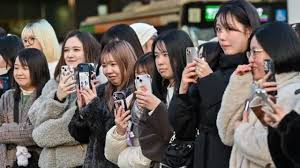
Residents of Toyoake, a small city in central Japan, are being encouraged to put their phones down and talk more, under a new ordinance that recommends limiting daily smartphone use to just two hours.
Mayor Masafumi Kouki, who championed the initiative, said the move was born out of growing concern about how technology is eroding face-to-face communication.
“I’ve worried for many months about the negative effects of excessive smartphone use, especially the sharp decrease in direct human communication,” Kouki told the media. “Even on trains, everyone just stares at their phones, and no one talks anymore. I don’t believe this should be considered normal.”
The ordinance, which came into effect last week, sets voluntary limits on the use of smartphones, laptops, and tablets for both adults and children. While there are no penalties for exceeding the two-hour cap, Kouki said the goal is to spark reflection and promote self-discipline.
“It’s not about punishment, it’s about awareness,” the 56-year-old mayor explained. “When the ordinance was first proposed, opposition was almost universal. But once people understood it was a guideline, not a strict rule, many became supportive.”
The measure, approved by the city council in a 12–7 vote, excludes time spent using devices for work or study. It also advises younger residents to set nighttime limits, with elementary school children urged to stop using smartphones after 9 p.m., and junior high students and older after 10 p.m.
Toyoake’s effort comes amid growing research linking heavy smartphone use and social media consumption with sleep deprivation, anxiety, and loneliness. Studies show Japanese adults already get some of the least sleep among developed countries, often due to long working hours, a trend now compounded by late-night screen time.
Kouki said he hopes the city’s new rule will inspire families and communities to “rediscover conversation” and rebuild genuine social connections in a digital age.AB


